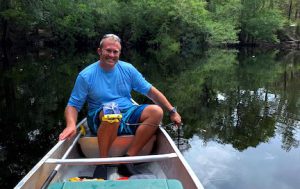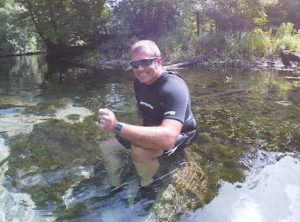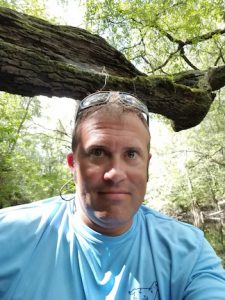The Soil and Water Sciences Department is offering students the chance to blog about their summer experience. The students enrolled in one of three courses over the summer, for which they received credit: SWS 4905-Individual Work, SWS 4911-Supervised Research in Soil and Water Science, and SWS 4941
Practical Work Experience. This is Lukas Pidgeon’s summer experience:

My name is Lukas Pidgeon. I am an incoming senior undergraduate in the Soil & Water Sciences Department with a Water Science emphasis. This summer I worked as a field scientist intern for The Howard T. Odum Florida Springs Institute (FSI) in High Springs.
Field & Office Work
As a field scientist intern, I worked alongside FSI staff conducting ecological monitoring of spring systems in the lower Santa Fe River. The fieldwork consisted of water quality sampling and measurement; flow rate measurements for spring systems, individual springs, rivers and creeks; vegetation and snail surveys; fish counts; light transmission measurements; and turbidity measures. While conducting fieldwork, I discovered there was a desire from the public to know what we were doing. This opened a dialogue to educate the public about spring health and restoration.
When I was not working in the field, I was in the office. In the beginning, I input the data we gathered from the field into spreadsheets for analysis and report generation. This data came from FSI and associated volunteer organizations. A day in the office also consisted of grab sampler calibration, labeling Department of Environmental Protection sample bottles, fish identification descriptions, and repair of field measurement tools. Towards the end of the summer, I researched information intended for an educational program on Florida springs and the aquifer. The audience is elementary-to-college students. I also wrote part of a fish identification resource and helped with the Save Our Springs: Mermaid Gala, a primary fundraising event for FSI.

The Right Path
This experience solidifies my desire to become a water scientist. I learned more about myself and my passion for natural water systems. It confirmed that applicational science and education are my personal strengths. I enjoyed being outdoors and the physicality of the job is rewarding for me. I found that learning about soil and water systems in lecture is supplemented by seeing and experiencing these systems firsthand. Physically and mentally immersing myself into the object of my studies places the knowledge learned in the classroom into perspective. I learned that non-profits require support from countless areas to be sustainable, from grants and donations to volunteers and interns.
I observed the importance of springs conservation and water use sustainability. Likewise, I saw the effects of spring water quality impairment due to excessive nitrogen inputs. The effects on the springs from excessive nutrients and decreased flow are quantifiable by excessive algae growth to changes in the human use and perspectives of the springs. I learned that the public perspective of what a healthy/unhealthy spring is, along with responsible use, needs to be addressed. I think the largest challenge for me with spring and aquifer health science is the need to re-educate a generation about the value of water in our state and how to ensure the future children of Florida will have healthy native water ecosystems for generations to come.

Well-Prepared
I felt secure in my knowledge as I began this work experience. The coursework offered in the Soil & Water Sciences Department provided the necessary foundation for me to be successful as a Springs Field Scientist. My courses in wetlands, sustainability, conservation, chemistry, soils, water, public health and more all provide invaluable information that I applied to this work experience. I believe if I was not a Soil & Water Sciences major, I would have been ill-equipped for the tasks required for this work. The courses offered in Soil & Water Sciences are the most complete and balanced for students looking to study soil, water or both. Along with a great curriculum, the faculty, staff, and students create a learning environment that is supportive and challenging. I am eager to begin my new semester and acquire more knowledge.
 0
0
